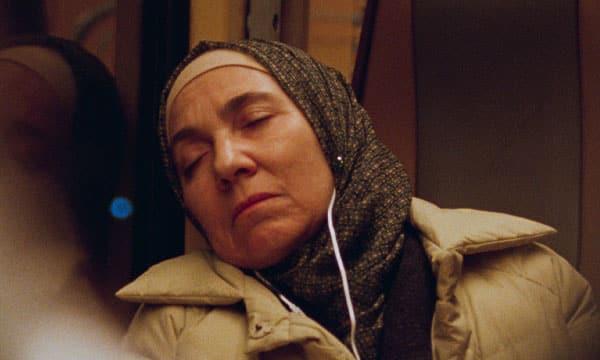Ghost Tropic

This is a FREE screening with a limited number of complimentary tickets. Please RSVP via our virtual-cinema-order-form; you will then be emailed a unique screening link for the film that will be active from Oct 30–Nov 5.
Belgian filmmaker Bas Devos’ third feature focuses entirely on a 58-year-old Muslim immigrant in Brussels. In this “delicate miniature that’s magnificently humanist, occasionally amusing and shot in a palette of rich, saturated nighttime hues… Khadija is a cleaning lady who mainly works after dark. When she accidentally dozes off on the last métro, she finds herself on the other end of town at night with no direct possibility to go home… Khadija isn’t a woman who likes to dawdle, so she immediately sets out into the night. The film’s setup couldn’t be more straightforward and yet it is surprisingly effective, as Devos, who also wrote the screenplay, gets his protagonist involved in a series of vignettes in which she meets with, accompanies or spies on different creatures of the night.… Cinematographer Grimm Vandekerckhove's shimmering nighttime photography, shot on rich Kodak stock, is dense and dark, moody yet never gloomy. It is also, quite often, unexpectedly gorgeous, as if to suggest that moments of beauty can be caught by those open to seeing them.” (Hollywood Reporter)
Director Devos writes: “In preparation for my second feature film, Hellhole, I spent a lot of time with young immigrants in Brussels.… I was curious about life in those large residential towers filled with unemployment and poverty, but also with a great deal of resilience and joy. Behind every door, in every apartment, there is a whole world. Worlds that often remain invisible. And the most invisible lives in the Cité, those of the mothers of the young people, interested me the most. Who are these women who wear colorful headscarves, strolling around the large courtyard and then disappearing into the elevator? In any case, they occupy a very precarious place in our society as women of color who are primarily Muslim.… Many of them are first or second generation migrants. They often work as cleaning ladies or housekeepers. And something that I found rather intriguing was that many of them look at their children’s generation with a mixture of distrust and a mild form of envy.…
“Throughout the film, Khadija meets a series of people. A homeless person, a security guard, immigrants, a gas station clerk, a night shop owner, and a night nurse. Their encounters are sometimes wordless, and sometimes they are merely observations. Sometimes, conversations arise. But soon it becomes clear that Khadija’s journey is slightly surreal in nature. This timid woman wouldn’t normally engage in these kinds of encounters, but circumstances force her to and she seems to see them as an opportunity. For her, the journey home is a modest revolution. A turning point. A leap in the dark.”
website: www.cinemaguild.com/theatrical/ghosttropic.html
Ithaca Premiere • Subtitled

